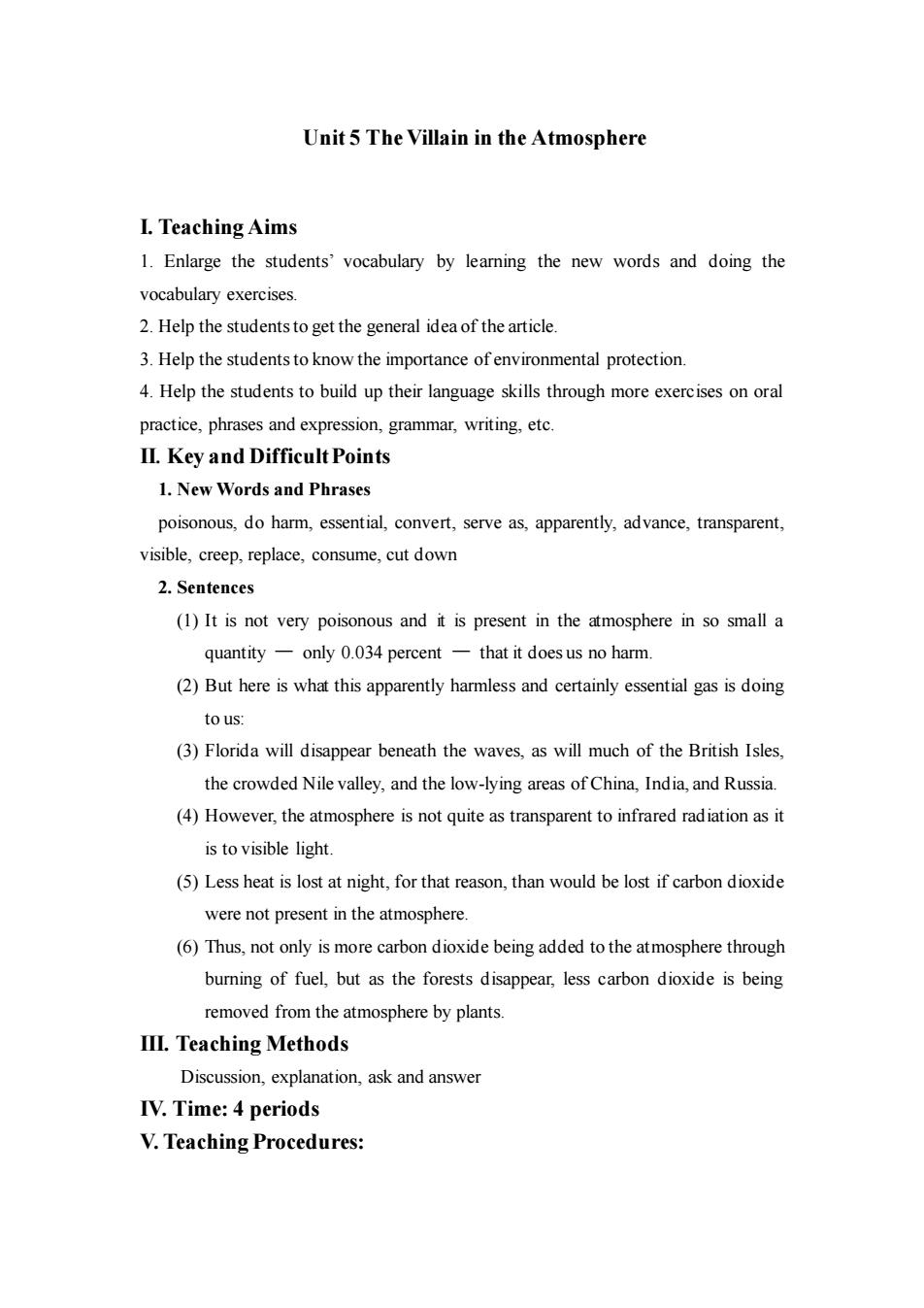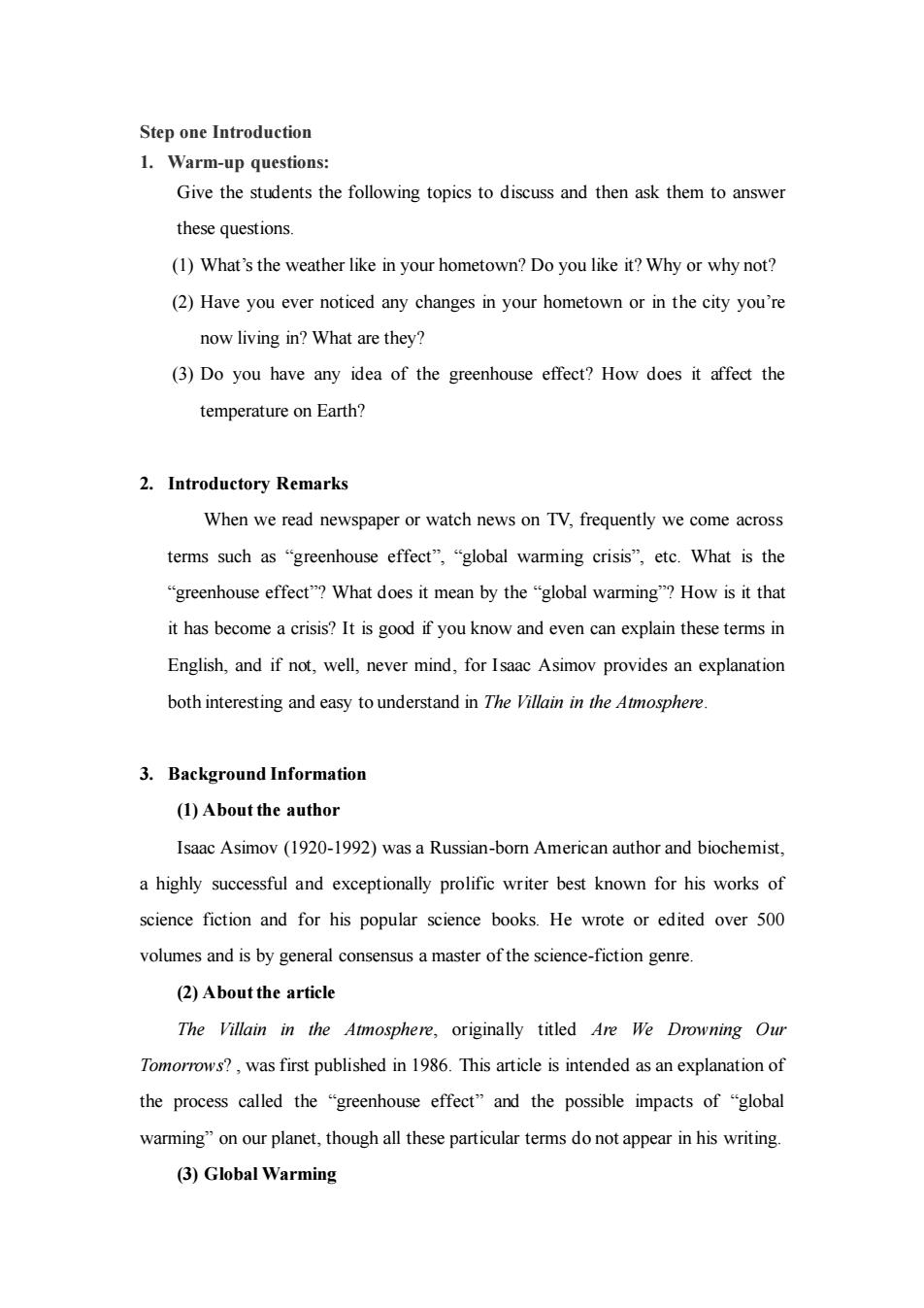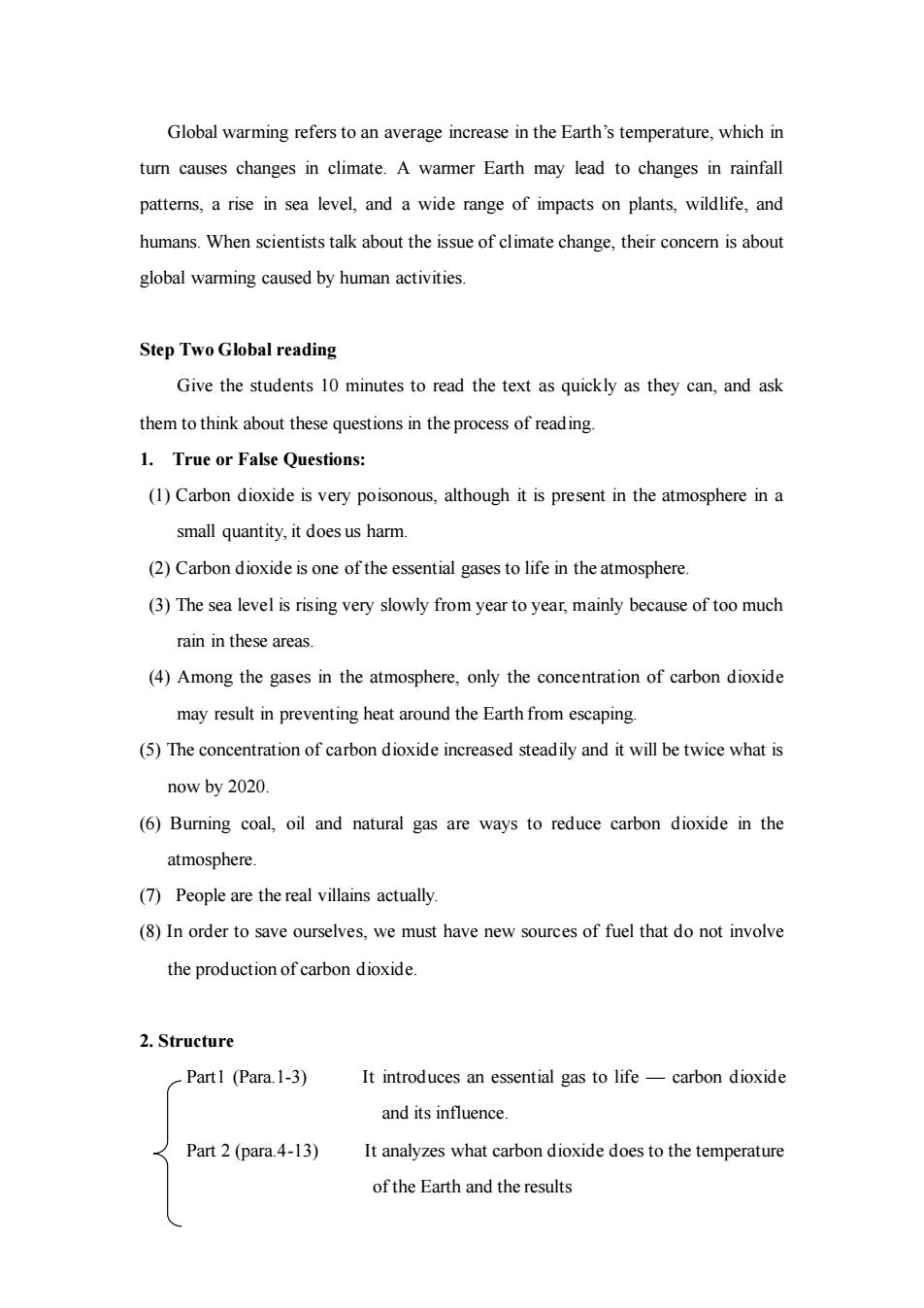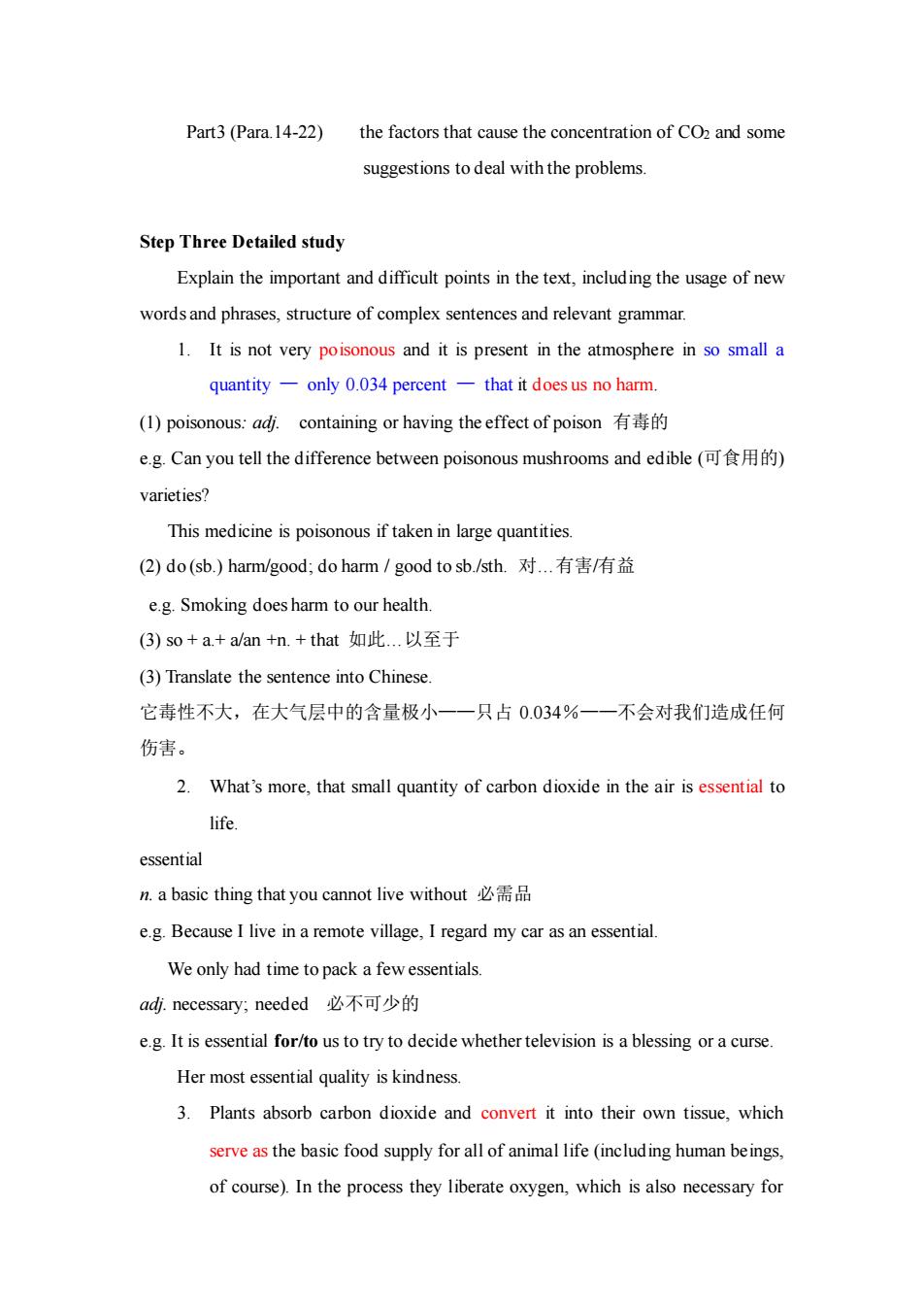
Unit 5 The Villain in the Atmosphere I.Teaching Aims 1.Enlarge the students'vocabulary by learning the new words and doing the vocabulary exercises 2.Help the studentsto get the general idea of the article. 3.Help the students to know the importance ofenvironmental protection. 4.Help the students to build up their language skills through more exercises on oral practice.phrases and expression,grammar,writing.etc. II.Key and Difficult Points 1.New Words and Phrases poisonous,do harm,essential,convert,serve as,apparently,advance,transparent, visible,creep,replace,consume,cut down 2.Sentences (1)It is not very poisonous and it is present in the atmosphere in so small a quantity-only 0.034 percent-that it doesus no harm. (2)But here is what this apparently harmless and certainly essential gas is doing tous: (3)Florida will disappear beneath the waves,as will much of the British Isles the crowded Nile valley,and the low-lying areas of China,India,and Russia (4)However,the atmosphere is not quite as transparent to infrared radiation as it is to visible light (5)Less heat is lost at night,for that reason,than would be lost if carbon dioxide were not present in the atmosphere. (6)Thus,not only is more carbon dioxide being added to the atmosphere through burming of fuel,but as the forests disappear,less carbon dioxide is being removed from the atmosphere by plants. III.Teaching Methods Discussion,explanation,ask and answer IV.Time:4 periods V.Teaching Procedures:
Unit 5 The Villain in the Atmosphere I. Teaching Aims 1. Enlarge the students’ vocabulary by learning the new words and doing the vocabulary exercises. 2. Help the students to get the general idea of the article. 3. Help the students to know the importance of environmental protection. 4. Help the students to build up their language skills through more exercises on oral practice, phrases and expression, grammar, writing, etc. II. Key and Difficult Points 1. New Words and Phrases poisonous, do harm, essential, convert, serve as, apparently, advance, transparent, visible, creep, replace, consume, cut down 2. Sentences (1) It is not very poisonous and it is present in the atmosphere in so small a quantity — only 0.034 percent — that it does us no harm. (2) But here is what this apparently harmless and certainly essential gas is doing to us: (3) Florida will disappear beneath the waves, as will much of the British Isles, the crowded Nile valley, and the low-lying areas of China, India, and Russia. (4) However, the atmosphere is not quite as transparent to infrared radiation as it is to visible light. (5) Less heat is lost at night, for that reason, than would be lost if carbon dioxide were not present in the atmosphere. (6) Thus, not only is more carbon dioxide being added to the atmosphere through burning of fuel, but as the forests disappear, less carbon dioxide is being removed from the atmosphere by plants. III. Teaching Methods Discussion, explanation, ask and answer IV. Time: 4 periods V. Teaching Procedures:

Step one Introduction 1.Warm-up questions: Give the students the following topics to discuss and then ask them to answer these questions (1)What's the weather like in your hometown?Do you like it?Why or why not? (2)Have you ever noticed any changes in your hometown or in the city you're now living in?What are they? (3)Do you have any idea of the greenhouse effect?How does it affect the temperature on Earth? 2.Introductory Remark When we read newspaper or watch news on TV,frequently we come across terms such as "greenhouse effect","global warming crisis",etc.What is the "greenhouse effect"?What does it mean by the"global warming"?How is it that it has become a crisis?It is good if you know and even can explain these terms in English,and if not,well,never mind,for Isaac Asimov provides an explanation both interesting and easy to understand in The Villain in the Atmosphere 3.Background Information (1)About the author Isaac Asimov(1920-1992)was a Russian-bom American author and biochemist a highly successful and exceptionally prolific writer best known for his works of science fiction and for his popular science books.He wrote or edited over 500 volumes and is by general consensus a master of the science-fiction genre. (2)About the article The Villain in the Atmosphere,originally titled Are We Drowning Our Tomorrows?,was first published in 1986.This article is intended as an explanation of the process called the "greenhouse effect"and the possible impacts of"global warming"on our planet,though all these particular terms do not appear in his writing. (3)Global Warming
Step one Introduction 1. Warm-up questions: Give the students the following topics to discuss and then ask them to answer these questions. (1) What’s the weather like in your hometown? Do you like it? Why or why not? (2) Have you ever noticed any changes in your hometown or in the city you’re now living in? What are they? (3) Do you have any idea of the greenhouse effect? How does it affect the temperature on Earth? 2. Introductory Remarks When we read newspaper or watch news on TV, frequently we come across terms such as “greenhouse effect”, “global warming crisis”, etc. What is the “greenhouse effect”? What does it mean by the “global warming”? How is it that it has become a crisis? It is good if you know and even can explain these terms in English, and if not, well, never mind, for Isaac Asimov provides an explanation both interesting and easy to understand in The Villain in the Atmosphere. 3. Background Information (1) About the author Isaac Asimov (1920-1992) was a Russian-born American author and biochemist, a highly successful and exceptionally prolific writer best known for his works of science fiction and for his popular science books. He wrote or edited over 500 volumes and is by general consensus a master of the science-fiction genre. (2) About the article The Villain in the Atmosphere, originally titled Are We Drowning Our Tomorrows? , was first published in 1986. This article is intended as an explanation of the process called the “greenhouse effect” and the possible impacts of “global warming” on our planet, though all these particular terms do not appear in his writing. (3) Global Warming

Global warming refers to an average increase in the Earth's temperature,which in turn causes changes in climate.A warmer Earth may lead to changes in rainfall patters,a rise in sea level,and a wide range of impacts on plants,wildlife,and humans.When scientists talk about the issue of climate change,their concem is about global warming caused by human activities. Step Two Global reading Give the students 10 minutes to read the text as quickly as they can,and ask them to think about these questions in the process of reading. 1.True or False Questions: (1)Carbon dioxide is very poisonous,although it is present in the atmosphere in a small quantity,it does us harm. (2)Carbon dioxide is one of the essential gases to life in theatmosphere. (3)The sea level is rising very slowly from year to year,mainly because of too much rain in these areas. (4)Among the gases in the atmosphere,only the concentration of carbon dioxide may result in preventing heat around the Earth from escaping (5)The concentration of carbon dioxide increased steadily and it will be twice what is now by 2020. (6)Burning coal,oil and natural gas are ways to reduce carbon dioxide in the atmosphere (7)People are the real villains actually. (8)In order to save ourselves,we must have new sources of fuel that do not involve the production of carbon dioxide. 2.Structure PartI (Para.1-3) It introduces an essential gas to life-carbon dioxide and its influence Part 2(para.4-13) It analyzes what carbon dioxide does to the temperature of the Earth and the results
Global warming refers to an average increase in the Earth’s temperature, which in turn causes changes in climate. A warmer Earth may lead to changes in rainfall patterns, a rise in sea level, and a wide range of impacts on plants, wildlife, and humans. When scientists talk about the issue of climate change, their concern is about global warming caused by human activities. Step Two Global reading Give the students 10 minutes to read the text as quickly as they can, and ask them to think about these questions in the process of reading. 1. True or False Questions: (1) Carbon dioxide is very poisonous, although it is present in the atmosphere in a small quantity, it does us harm. (2) Carbon dioxide is one of the essential gases to life in the atmosphere. (3) The sea level is rising very slowly from year to year, mainly because of too much rain in these areas. (4) Among the gases in the atmosphere, only the concentration of carbon dioxide may result in preventing heat around the Earth from escaping. (5) The concentration of carbon dioxide increased steadily and it will be twice what is now by 2020. (6) Burning coal, oil and natural gas are ways to reduce carbon dioxide in the atmosphere. (7) People are the real villains actually. (8) In order to save ourselves, we must have new sources of fuel that do not involve the production of carbon dioxide. 2. Structure Part1 (Para.1-3) It introduces an essential gas to life — carbon dioxide and its influence. Part 2 (para.4-13) It analyzes what carbon dioxide does to the temperature of the Earth and the results

Part3(Para.14-22)the factors that cause the concentration of COz and some suggestions to deal with the problems. Step Three Detailed study Explain the important and difficult points in the text,including the usage of new words and phrases,structure of complex sentences and relevant grammar. 1.It is not very poisonous and it is present in the atmosphere in so small a quantity-only 0.034 percent-that it does us no harm. (I)poisonous:.ad.containing or having the effect of poison有毒的 e,Can you tell the difference between poisonous mushrooms and edible(可食用的) varieties? This medicine is poisonous if taken in large quantities. (2)do(sb.)harm/good:do harm/good to sb./sth.对.有害/有益 e.g.Smoking does harm to our health. (3)so+a.+a/an+n.+that如此..以至于 (3)Translate the sentence into Chinese. 它毒性不大,在大气层中的含量极小一一只占0.034%一一不会对我们造成任何 伤害。 2.What's more,that small quantity of carbon dioxide in the air is essential to life. essential n.a basic thing that you cannot live without必需品 e.g.Because I live in a remote village,I regard my car as an essential. We only had time to pack a fewessentials ad.necessary;needed必不可少的 e.g.It is essential for/to us to try to decide whether television is a blessing or a curse. Her most essential quality is kindness. 3.Plants absorb carbon dioxide and convert it into their own tissue,which serve as the basic food supply for all of animal life(including human beings, of course).In the process they liberate oxygen,which is also necessary for
Part3 (Para.14-22) the factors that cause the concentration of CO2 and some suggestions to deal with the problems. Step Three Detailed study Explain the important and difficult points in the text, including the usage of new words and phrases, structure of complex sentences and relevant grammar. 1. It is not very poisonous and it is present in the atmosphere in so small a quantity — only 0.034 percent — that it does us no harm. (1) poisonous: adj. containing or having the effect of poison 有毒的 e.g. Can you tell the difference between poisonous mushrooms and edible (可食用的) varieties? This medicine is poisonous if taken in large quantities. (2) do (sb.) harm/good; do harm / good to sb./sth. 对…有害/有益 e.g. Smoking does harm to our health. (3) so + a.+ a/an +n. + that 如此…以至于 (3) Translate the sentence into Chinese. 它毒性不大,在大气层中的含量极小——只占 0.034%——不会对我们造成任何 伤害。 2. What’s more, that small quantity of carbon dioxide in the air is essential to life. essential n. a basic thing that you cannot live without 必需品 e.g. Because I live in a remote village, I regard my car as an essential. We only had time to pack a few essentials. adj. necessary; needed 必不可少的 e.g. It is essential for/to us to try to decide whether television is a blessing or a curse. Her most essential quality is kindness. 3. Plants absorb carbon dioxide and convert it into their own tissue, which serve as the basic food supply for all of animal life (including human beings, of course). In the process they liberate oxygen, which is also necessary for

all animal life. (1)convert:vt. I)change from one form or use to another(使)转变,转换 e.g.Coal can be converted to gas. I want to convert some dollars into pounds. 2)persuade or induce to adopt a particular religion,.faith,or belief(使)改变(宗教 或信念),改变(想法或习惯) e.g.Ann has converted to Catholicism. She managed to convert him to her opinion. (2)serve as:be used for a particular purpose e.g.The curriculum propel would serve only as a guideline for teachers There was an old temple that served as a school for the kids. 4.But here is what this apparently harmless and certainly essential gas is doing to us: (I)apparently:adk:according to the way sth.appears显然,看来 e.g.Apparently she was trying her best to save her child from severe illness. Apparently,you have donea lot of work (2)Analyze the structure of the sentence. It is an inversion."here"is used at the beginning of the sentence.The subject of the sentence is a complex sentence,consisting of a subject clause "what this apparently harmless and certainly essential gas." ()Translate the sentence into Chinese. 然而,这一看上去无害而且无疑又必不可少的气体却正在对我们产生影响。 5.Where there are low-lying coastal areas (where a large fraction of the world's population lives)the water will advance steadily,forcing people to retreat inland (1)advance v. 1)to move forward towards sb/sth.前进,(使)向前移动 e.g.The troops were finally given the order to advance
all animal life. (1) convert: vt. 1) change from one form or use to another (使)转变,转换 e.g. Coal can be converted to gas. I want to convert some dollars into pounds. 2) persuade or induce to adopt a particular religion, faith, or belief (使)改变(宗教 或信念),改变(想法或习惯) e.g. Ann has converted to Catholicism. She managed to convert him to her opinion. (2) serve as: be used for a particular purpose e.g. The curriculum propel would serve only as a guideline for teachers. There was an old temple that served as a school for the kids. 4. But here is what this apparently harmless and certainly essential gas is doing to us: (1) apparently: adv. according to the way sth. appears 显然,看来 e.g. Apparently she was trying her best to save her child from severe illness. Apparently, you have done a lot of work. (2) Analyze the structure of the sentence. It is an inversion. “here” is used at the beginning of the sentence. The subject of the sentence is a complex sentence, consisting of a subject clause “what this apparently harmless and certainly essential gas.” (3) Translate the sentence into Chinese. 然而,这一看上去无害而且无疑又必不可少的气体却正在对我们产生影响。 5. Where there are low-lying coastal areas (where a large fraction of the world’s population lives) the water will advance steadily, forcing people to retreat inland. (1) advance v. 1) to move forward towards sb./sth. 前进,(使)向前移动 e.g. The troops were finally given the order to advance